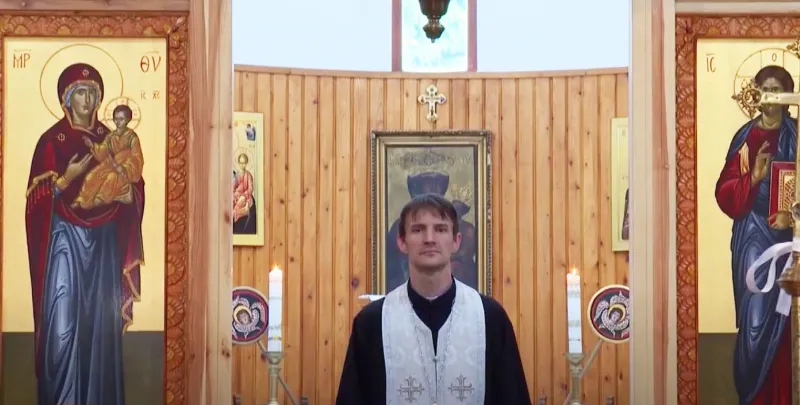
Nyiregyhaza, Hungary, Jul 24, 2021 / 15:00 pm (CNA).
When Fr. Árpád Kanyó first arrived at his current parish, he didn’t know the language or culture of the people there. But he quickly learned about – and embraced – the new community he encountered.
80 years ago, Fr. Miklos Soja established the first Romani, or Gypsy, Greek Catholic church in Hungary. He wanted a place where the Romani could pray the liturgy in their native language. Today, Fr. Kanyó serves as the pastor of the Greek Catholic Church of the Ascension. He spoke with EWTN News In Depth about his experience in a segment that aired July 16.
Fr. Kanyó arrived in 2014, with his wife and three young daughters, as in the Eastern Catholic Churches married men can be ordained to the priesthood.
“When I came here to Hodász, I had to celebrate the liturgy in the Roma language,” he remembered. “Before the ceremony, I turned to the congregation and I said, ‘I’m sorry, but I’m going to do the first non-Hungarian liturgy of my life. If I say something ridiculous or ugly, please forgive me.’”
“When the liturgy was over,” Fr. Kanyó continued, “one of the believers came to me and said, ‘Father, of all the priests, your liturgy has been the best so far.’”
He hopes to provide a good example of Christian and family life. But he and his family are also learning from the Romani. His wife, Mária, said she fell in love with the culture and tradition of the parishioners.
“When I saw them dancing for the first time, I was fascinated,” she recalled. “And when we moved here and I heard them singing during the liturgy in the Roman language, that brought tears to my eyes.” She also admires their traditional clothing.
“For me, dance and conversations with them are so important and I am always friendly and available to them,” she stressed.
Their culture and community, in many ways, centers on dance and music. As the cantor and lay president of the parish, Sándor Lakatos highlighted the importance of fellowship.
“For me, the Greek Catholic faith means a strong community,” he said. “It’s like heaven, where everyone has a place. One has to belong somewhere. For me, Greek Catholicism means a family where we gather around and talk, rejoice and sometimes cry together.”
At the same time, the community also faces challenges. The church has lost parishioners like Ahmed Hanzam, who emphasized that he’s living through a difficult period in his life right now.
“It was different long ago,” he said. “People had solidarity. Now there is no cohesion.”
The village also suffers from unemployment and a lack of higher education. Many are forced to move far away only to work in unqualified jobs.
And, according to Fr. Kanyó, “many Hungarians from this village also go far to work in factories.”
“That is why it’s our great task to forge and keep those belonging to our Roma people, or as we call them here, Gypsy community, together,” he said.
He strives to follow in the footsteps of Fr. Miklos Soja.
“He didn’t look at how difficult it was for the people here, who at that time lived in huts dug into the ground,” Fr. Kanyó said, “He came down to them and brought joy into the midst of their hardship.”
If you value the news and views Catholic World Report provides, please consider donating to support our efforts. Your contribution will help us continue to make CWR available to all readers worldwide for free, without a subscription. Thank you for your generosity!
Click here for more information on donating to CWR. Click here to sign up for our newsletter.




Decades past [many as such] on sentry duty a well below zero Bavarian night the enchanting balalaika tones happy voices drifted out of the deep dark forests. First thought gypsies, who else in the middle of the night. Would that Italy had
Fr Árpád Kanyó priests Eastern Rite yes married with kids to work with, rather convert the repulsive, devious, aggressive gypsies in Rome and throughout Italy. Women Zingeras pushing into priests on streets in buses grabbing their wallets screaming assault. Aggressively belaboring Christian forbearance. Italy is not Hungary. Italians wonderfully accepting though too lax in this man’s opinion. Perhaps a moral disease perhaps not. Although their response to the ever present Zingeras and Zingeros is pathetically passive. Maybe italian tolerance is a reaction to Nazi German intolerance who consigned the Romani to the death camp ovens. Enough said on ambivalent leadership Italy’s plague some other priestly blood of a different persuasion would help. Although Italy surviving the centuries has the gift of working things out.
Although, in addition moral passivity isn’t particular to Italy. Muslim migration has brought multiple violence and rape problems throughout Europe. Rape gangs in N Britain and Scotland, girls molested, raped in Sweden, Catholic young women molested on their way to Mass in front of the Cologne Cathedral. I remarked here at the time, What’s happened to European men? Hungary and Poland don’t appear to have these issues, at least the reported incidents. And both nations among Europeans are decidedly more Catholic in their identity and practice. What might be inferred is that spiritual decline is concomitant with moral passivity. Men generally have less conviction of a moral duty to protect women. It is indeed a moral issue as is indicated in scripture, that we have the obligation to protect the weak when threatened or violated.